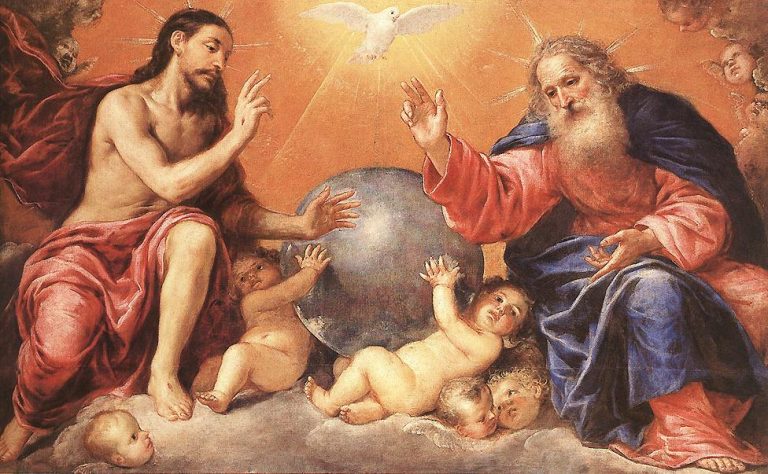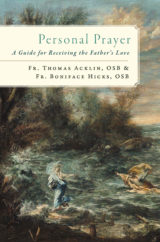By Fr. Boniface Hicks, OSB, and Fr. Thomas Acklin, OSB
Fr. Boniface Hicks, OSB, is a Benedictine monk of St. Vincent Archabbey in Latrobe, Pennsylvania. He has provided spiritual direction for many men and women, including married couples, seminarians, consecrated religious, and priests.
Fr. Thomas Acklin, OSB, is is a Benedictine monk of Saint Vincent Archabbey in Latrobe, Pennsylvania. He is a psychoanalyst as well as a spiritual director. Fr. Acklin has been a professor and spiritual director at Saint Vincent Seminary, where he also served as rector.

The disciples asked the Lord to teach them to pray. In fact, it is the Lord who leads the way every time we pray, and He teaches us how to pray. Without Him prayer is not possible and without Him we would be simply talking to ourselves or talking to nothing. Jesus becomes transparent and introduces us to our Father in the Holy Spirit, revealing that God is three Persons in one God. In prayer we are taken up into the intimate relationships among the persons of the Trinity. This is the reason why we always begin our prayer with the sign of the cross, making our prayer in the name of the Father, and of the Son, and of the Holy Spirit.
The relationship among each of the divine persons is spousal, each one infinitely pouring out his divine self to each of the other divine persons. This infinite spousal love is so perfect that these three persons are one. The more they are one, the more they infinitely pour out divine love. Thus their spousal love is at once unitive and generative, as is the spousal love of a man and a woman. Our creation was not necessary, but is the generative fruit of the unitive spousal love of each of the persons of the Trinity and of their unity.
The more we enter into this spousal love by a finite, total offering of self, the more we become like God, because our finite love participates in infinite love and makes our love more like His, makes us more like God. This prayer is contemplative because it is taken up, beyond appearances, into the very heart of God, into the love of God. For this reason, it is love that makes us like Him.
The Holy Spirit, who is Himself the Love of God, has a special role in prayer. “Through pure grace, the Holy Spirit freely communicates to the soul that humbly welcomes Him what He has received in the depths of God: the blessing of the Father and the thanksgiving of the Son in a transforming harmony of love and knowledge.” In this way, the Holy Spirit moves us into greater freedom. The freer our will becomes, the more our will actually becomes conformed to the will of God. This freedom is beyond mere human freedom; it is the freedom of the adopted children of God. Then we experience the Holy Spirit not only leading us in prayer, but praying in us.
“The Spirit too comes to the aid of our weakness, for we do not know how to pray as we ought, but the Spirit himself intercedes with inexpressible groanings” (Rom 8:26). One of the authors actually had the privilege of witnessing St. John Paul praying privately. He began with eyes closed praying silently, and then slowly his head would begin to drop. About the time his chin touched his chest he would begin groaning in a low deep way. Then he would fall silent as his head rose and then began to drop again. He seemed to be wrapped in prayer and to have surrendered to the Spirit.
Because of the infinite depths of God, prayer can go deeper beyond what is possible in any other relationship. Indeed, the infinite depths of God can take in our own depth which reaches out into the infinite as deep calls out to deep (see Ps 42:7). To reach these infinite depths, however, it is necessary to die to ourselves and pour ourselves out into God.
You Might Also Like

Prayer is at the heart of the Christian life. Given that we are weak and even sinful human beings, how can it be that God has anything to do with us? What does it mean to have a personal relationship with God? Why is God so silent and hidden? How do we grow in prayer? Personal Prayer: A Guide for Receiving the Father’s Love brings the depth of human experience together with the Catholic tradition of prayer to present the path to an intimate and vulnerable relationship with God.

